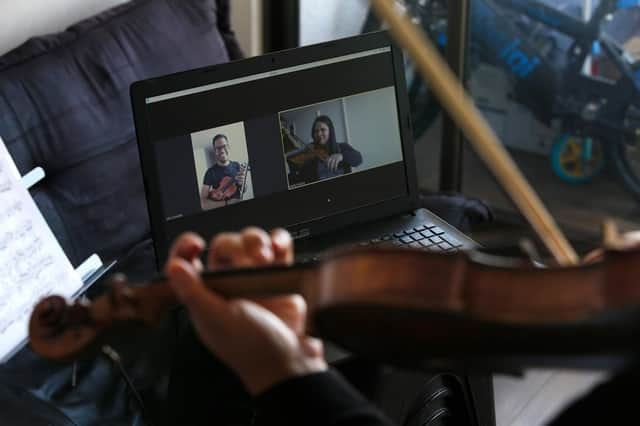Covid pandemic forced music lessons online. Now we can use that to dramatically increase access to tuition – Linda Boyd


With that in mind, we viewed the pandemic and resultant lockdowns pretty pessimistically. The doors to our school would be closed, and only when all restrictions were lifted would we be able to impart any tuition whatsoever.
But like so many other businesses across Scotland this period of enforced adaptation has actually opened opportunities none of our teachers or pupils would ever have thought possible.
Advertisement
Hide AdAdvertisement
Hide AdNot only has online learning thrived throughout the last year, it will be here to stay for some time to come, even when normality returns.
It has opened doors for learners in rural areas of Scotland who’d be lucky to find much in the way of professional teachers within a 20-mile radius.
And it’s expanded the breadth of options too: one of our pupils from the Borders told us recently that they had no trouble in finding guitar or piano lessons nearby… but he wanted to learn to play the flute.
In our younger pupils, it has also helped bring some who suffered from confidence issues out of their shell.
Travelling into a studio to sit opposite a teacher can be intimidating at first.
Swap that for a bedroom and a computer screen, and suddenly some youngsters can be at ease with the instrument they are attempting to master.
Access to music lessons for young people from deprived areas of Scotland has long been talked about.
An enduring solution has never really been brought into practice, but perhaps use of technology holds the key.
Advertisement
Hide AdAdvertisement
Hide AdAnd that’s where some time and resources should now be invested by the government.
It’s possible to make things work on platforms like Zoom or Skype, but the development of a proper portal where pupils and teachers could link up and use a range of tools would be preferable.
Such a format could enable progress to be recorded, quick access to learning materials, and even a collaboration with pupils in other schools, cities or even countries.
It would also act as a resource for youngsters to join together in bands and choirs without having to rely on people in their immediate geographical area.
One of the obstacles local authorities have cited in reducing or scrapping free music lessons was that they simply couldn’t afford them.
Take aside the argument that these things are worth paying for from a public health and educational point of view, perhaps shifting to an online format could cut significant costs?
And of course, even with the vaccination roll-out and progress in terms of reducing the severity of Covid, people are still scared.
If you’ve been shielding or have elderly relatives you need to see regularly, you might not want to immediately re-engage when restrictions lift fully.
Advertisement
Hide AdAdvertisement
Hide AdFor those people, better online solutions in every walk of life, whether that’s shopping, accessing key services or music lessons, will be required.
In an ideal world, the pandemic would never have happened. But as musicians know better than anyone, the future will be very much about making online alternatives work to ensure everyone who wants to learn a musical instrument has the opportunity to do so.
Linda Boyd is director of Morningside School of Music
A message from the Editor:
Thank you for reading this article. We're more reliant on your support than ever as the shift in consumer habits brought about by coronavirus impacts our advertisers.
If you haven't already, please consider supporting our trusted, fact-checked journalism by taking out a digital subscription.
Comments
Want to join the conversation? Please or to comment on this article.
